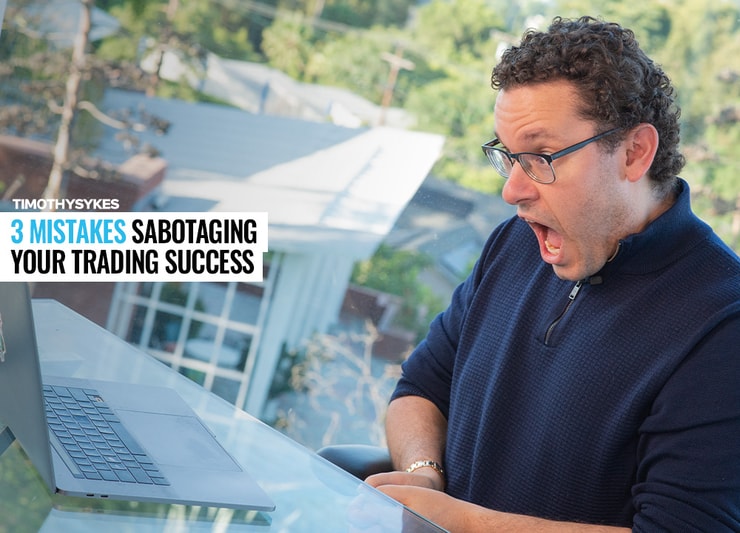I sent this tweet out yesterday:
You CAN achieve more than you realize, but the barrier to entry on great success is much higher than you realize so be willing to put in the hard world, time & effort first, stay dedicated & patient through the ups & downs & eventually build your own dream career/life over time!
— Timothy Sykes (@timothysykes) March 28, 2023
I genuinely believe it.
But unfortunately, the majority of traders will never reach their full potential.
This market isn’t for the faint of heart.
It pains me to see traders repeating the same mistakes…over and over again.
There are three I see that can put an absolute stop to your progress.
I outline what they are and how to correct them.
#1 The Harsh Truth: Managing Expectations In This Market

In 2020 I made $1.19 million, and $1.076 million in 2021. The markets were hot and I did my best to exploit them. However, 2022 was difficult for most traders, with the markets having one of their worst years since the 2008 financial crisis.
I still managed to make $130K…but it was a far cry from what I did in 2020 and 2021.
But that didn’t upset me. I took what the market gave me.
Q1 2023 hasn’t been easy either.
That’s just the nature of the beast.
After +20 years of trading, I understand that trading has its peaks and valleys.
I tell my students that there’s a time for learning and a time for earning. Right now, it’s all about learning.
So many newbie traders got involved in the markets over the last few years, and think we will have that same excitement and opportunity…
But those are the WRONG expectations.
Now is not the time to be swinging for the fences. Instead of making profit goals for yourself…make process goals.
Pay attention to the following:
- Trends
- What’s working
- Your trading plan
- Execution
- Risk Management
Professional athletes develop their skills and work on their games during the off-season.
This slow period in the market is like our off-season. But if you study hard and improve, you’ll be ready to take advantage of opportunities when the market heats up again.
I’ve been taking smaller traders, focusing on cutting losses quickly, and taking fast profits.
Why?
Because it keeps me sharp.
I’m getting my reps in.
I donate all my profits to charity…so I would love to make more…but I also want to be safe and not force action when there isn’t anything there.
Too many noobs are forcing the action and are losing money on stuff they shouldn’t be trading…or being that aggressive with.
#2 No One Knows What’s Going To Happen

Will trading be dead like this for the rest of the year?
Are there ever going to be big money-making opportunities again?
Should I even be trading if I can’t make money?
So many noobs are worried about things they can’t control. They focus way too much on making money than what’s really important…
Learning and Getting Better
The approach I’ve found to work best for me is to take it one trade at a time.
It hasn’t ended well every time I’ve tried to force a trade.
It seems like the more you try to make money, the less successful you are at trading. I know…that sounds counterintuitive…but that’s how this game is played.
That’s why I tell my students to focus on the setup and ensure the play is safe.
More Breaking News
- Robinhood Appointed Trustee for Trump Accounts, Stock Rises
- Under Armour Battles Data Breach Amid Revenue Challenges
- Datadog Sees Price Target Shifts Amid Market Changes
- Price Predictions Fueled by Company Moves In Market Dynamics
#3 Trading Is Not A Team Sport

Short-sellers love team trading. For whatever reason, they find comfort in knowing that other traders are betting against a stock…maybe it helps their confidence or something.
Or maybe they know that misery loves company…
While I think short-selling can be profitable…it’s not a strategy for newbie traders or folks with a small trading account.
It only makes sense if you’ve got a huge bankroll and you’ve proven that you’re profitable. In the end, most short-sellers get their butts handed to them. And if you have a small account, it only takes one or two trades to wipe you out.
Before I got into teaching, I traded solo. I made millions doing it. And even though I have a chat room now, I tell my students never to follow me into my trades.
I want them to be self-sufficient.
And I’m proud of my millionaire students who have developed their own trading style. That’s how it should be.
So many fake traders on social media post their phony wins (never losses), yet none of these clowns have any success stories.
You can’t copy and paste your way to success.
Learn to embrace that trading is a one-man/woman sport.
You must become an independent thinker.
Trading isn’t meant to be a social gathering. And yes, it can be lonely. But you need to accept it. You shouldn’t rely on others to give you ideas or hold your hand through trades.
I teach a process…I teach strategies…I teach a mindset.
It’s on you to take what I teach and make it yours.
Part of becoming an adult is taking responsibility for your actions.
Embrace the challenge you have in front of you.
It won’t be easy…but no one ever said it would be.
If you need help fine-tuning your process and developing the skills necessary to compete in these markets, click here for more information.


Leave a reply